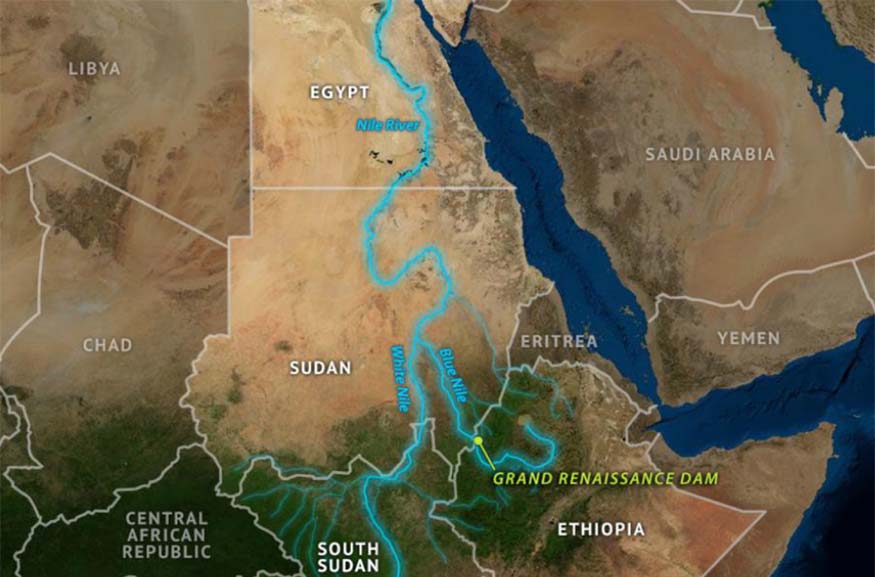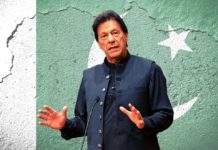Disclaimer: The Eqbal Ahmad Centre for Public Education (EACPE) encourages critical and independent thinking and believes in a free expression of one’s opinion. However, the views expressed in contributed articles are solely those of their respective authors and do not necessarily reflect the position or policy of the EACPE.
Ismail Serageldin, the former vice-president of World Bank, predicted in 1995 that 21st century wars would be fought over water. His prediction makes sense observing how Cairo threatened Ethiopia to go for war if the later continued to build its networks of dams. Ethiopian Prime Minister Abiy Ahmed won the Nobel Peace Prize for his work in starting peace negotiations with Eritrea. But Ethiopia finds itself in the middle of another major dispute that threatens regional stability. This one is over the waters of the Nile River, specifically Ethiopia’s plans to build the Grand Ethiopian Renaissance Dam on the river’s Blue Nile tributary. Ethiopia and Egypt stand against each other over the Grand Ethiopian Renaissance Dam which Ethiopia is building on the border with Sudan over the Blue Nile tributary which originates from the Lake Tana. When they done building it, the reservoir will be larger than Greater London and covers over almost 1700 sq km. The Grand Ethiopian Renaissance Dam’s (GERD) reservoir will hold up to 67 billion cubic meters of water.
Why Ethiopia is building this dam at first place? This dam is supposed to revive the Ethiopia’s economy. It will provide electricity to millions of people. Currently, two-third of population is not connected to the national grid, which estimates to about 70 million people who are deprive of basic necessity for living. Right now, the total capacity of Ethiopia is 4 thousand megawatt while on the other hand the GERD will generate 6 thousand megawatt of electricity. It means Ethiopia can also export electricity. Another blessing in disguise is that neighboring countries of Ethiopia also have similar power deficiency. GERD will improve the foreign hard cash reserves of Ethiopia as well. In short, this giant dam is a win-win situation for Ethiopia. The unpredictable dry and wet weather in the Nile Basin caused in part by climate change is contributing to intermittent floods and water shortages. Ethiopia’s plan will even out Nile water flow, making such events less likely, and damages will be on the lower proportion.
The massive dam that Ethiopia is building on part of the Nile could spark a dire drought in Egypt because of the dramatic reduction of water Egypt receives from the Nile.
The reaction of Egypt over this dam is understandable if one unfolds the historical events. Two agreements, from 1929 and 1959, have guided the use of the Nile River north of Ethiopia thus far. The 1929 Anglo-Egyptian treaty was signed by the United Kingdom, the colonial power in much of East Africa at the time, and monarchical Egypt—which was under British occupation—to allocate water rights along the basin. According to this treaty, Egypt and Sudan were guaranteed an annual supply of 48 billion and 4 billion cubic meters, respectively, out of an estimated yearly yield of 84 billion cubic meters of Nile water. Another agreement in 1959 between the United Kingdom and independent Egypt increased Egypt’s share from 48 to 55.5 billion cubic meters and Sudan’s share witnessed a hike from 4 billion cubic meters to 18.5 billion cubic meters, with the rest shared by the other countries along the river. The new treaty of 1959 also reaffirmed an essential provision from the 1929 agreement which states that Egypt holds the power to veto any construction projects that could impede the flow of water into the Nile.
Here arises the problem. The massive dam that Ethiopia is building on part of the Nile could spark a dire drought in Egypt because of the dramatic reduction of water Egypt receives from the Nile. Economists estimate that the country will lose 10 billion cubic meters of water a year, out of an average of about 50 billion cubic meters annually that it was getting until two years ago – although that dropped in 2019 to less than 44.5 billion cubic meters – all this before the lake Ethiopia is creating has reached capacity behind the dam due to several climate change effects. On the other hand Ethiopia has promised Egypt that it will receive its full share of water but without any formal agreement. End result will be that the Egyptian Nile will always be at the mercy of Ethiopian authorities. Cairo faces other fear as well. Egypt imports about 50% of its grain crops. Due to water shortage the percentage of imports will increase and it will put pressure on the foreign reserves of Egypt. Cairo lowered its unemployment rate from 14% to 7.5%, which is a great achievement, but the GERD will dent it and dent it badly as Egypt will lose 1.8 out of 8.5 million feddan of land which is right now under cultivation. If that happens, it is estimated that about 1 million jobs in agriculture will disappear and the unemployment rate will surge dangerously. Moreover, the average per capita quota of water of Egypt is 600 cubic meter a year, it will also decline to a stage declared as “water poverty level”.
What Egypt can do? The level of water was decreasing even when Ethiopia was not building this dam due to climate changes. Reduced water flows over several years means tough choices, not only for who gets the water but what type of crops one grows. Egypt can prioritize the domestic food supply or export markets. Egypt can take the dispute to International Court of Justice (ICJ) in Hague, Netherlands. But this option seems unrealistic because it would require both sides to agree to such arbitrations. If both parties go to ICJ even then it would be unlikely to witness the decision in Egypt’s favor because Ethiopia has a right to develop the water resources in its territory.
What could be done? Ethiopia wants as short a period as possible to fill the dam, whereas Egypt wants as long a period as possible. They should negotiate and meet somewhere in the middle like modern democratic states. Better results can be achieved by negotiations, not by wars. Let’s just hope that the prediction made by vice president of World Bank Ismail Serageldin doesn’t come true and region witnesses a peaceful settlement. Let’s hope the two parties turn out to be wiser.
Written by Ali Asad Sabir







